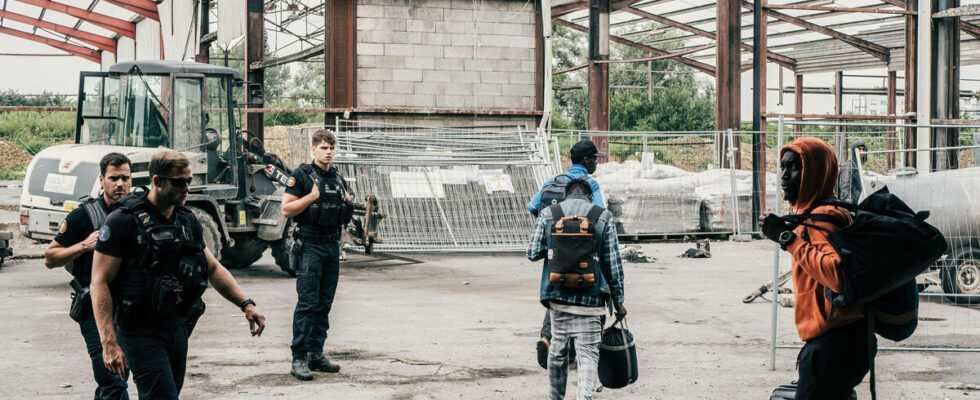At the entrance to the camps, associations have installed boxes bearing the names and telephone numbers of migrants to remind the authorities that they must allow them to assert their rights before carrying out expulsions.
Metal boxes, intended to receive mail, in front of the jungle of Calais. This is the new initiative carried out by associations helping exiles to try to limit evictions from these precarious camps. In any case those which, occurring on average once a month, can completely empty a piece of land, according to the association Human Rights Observers (HRO), which documents the actions of the State towards exiles. Today, the latter would be 1,600 in Calais, estimate the associations. They mostly flee countries at war, Sudan, Eritrea, Afghanistan, and want to join Great Britain.
These mass expulsions must follow the classic legal circuit: “The owner of the land appoints a bailiff, to go and see the installation, and to collect the identity of the people, to assign them to justice, explains a lawyer from HRO. But he goes there without an interpreter, and asks in French for the identity of the people. Which gives minutes full of mutual incomprehension. For example this summary displayed before expulsion in front of the bridges of Calais, under which exiles sleep, relayed on Twitter by the Auberge des Migrants : “I note the presence of nine people and twelve tents. A campfire is lit. Many people come to meet us. I give them my surname, first name, quality and purpose of my mission, and ask them if they speak French. These people don’t seem to understand and for only answer, I get: “Arabic”.
As a result, note the associations helping exiles in their press release, “the inhabitants of these places are sinisterly considered by the authorities as “unnamed persons””impossible to identify, and therefore to sue. “We therefore move on to another procedure, that of an order on request before the competent court”, explains HRO. “A judge will rule, with the elements of only one of the parties.” The only point of view of the owner, without hearing that of the exiles.
“We take away their humanity”
“It’s horrible to say that they don’t have an identityreacts Marguerite Combes, coordinator of the Utopia 56 association in Calais, their humanity is taken away from them. Exiled people have a name, and it is possible to talk to them, provided you have an interpreter.” The mailboxes, made with recycled metal doors, have already been installed in front of three camps in Calais, in the Beau-Marais district, and bear the first and last names of voluntary exiles. “It would now be in very bad faith to say that they are not identifiable”, believes Pierre Roques, coordinator of the Auberge des migrants. Asked, the prefecture of Pas-de-Calais has not yet reacted to this initiative.
The associations thus hope to limit the most significant evictions. There remain the usual evacuations, which target the same places every 36 or 48 hours, a police rotation that punctuates Calais mornings. “It’s almost daily”, notes Pierre Roques. The exiles must then move their tent, for example by placing it on the sidewalk. Objective: identify tents without occupants, and remove them. “The police go around, then people put everything back in place”, explains the activist. These operations are based on flagrante delicto, provided that the illegal installation has been observed less than 48 hours before.
These offensives against the legality of the evictions carried out in Calais have already been successful: the Douai Court of Appeal condemned the prefect of Pas-de-Calais last week for having taken the initiative to proceed with the dismantling of a exile camp, in September 2020, without the authorization of the judge, normally necessary. The prefecture has not yet indicated whether it wishes to appeal this decision.
